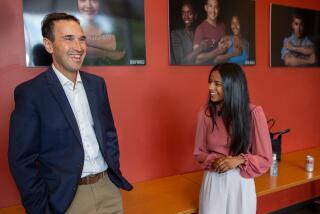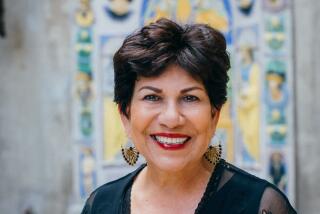Cecilia Preciado Burciaga dies at 67; longtime Stanford administrator
As one of the first high-ranking Latina administrators at a top American private university, Cecilia Preciado Burciaga inspired and mentored hundreds of Chicano and Latino students and faculty members during 20 years at Stanford University.
She taught hesitant young women and men, many the first in their families to attend college, that they belonged and could thrive at the elite private school, and later kept more than a few from dropping out. She soothed nervous parents, persuading them, in Spanish and English, that the university was a safe place for their children and that it would open their eyes to new worlds.
At Stanford, she also successfully pushed university leaders to hire additional Latinos, African Americans, Native Americans and women for faculty positions, and admit more to graduate programs.
Strong, nurturing and a fierce advocate for the people and causes she believed in, Burciaga died Monday at Stanford Hospital, her daughter Rebeca said. She was 67 and had been diagnosed with lung cancer in August.
“She was a role model for so many of us,” Alma Medina, a San Diego lawyer who was a Stanford undergraduate and law student during Burciaga’s tenure, said Wednesday. “She inspired and mentored generations of Chicano students and professors to make a difference in our communities. She said we each have great responsibility in the world, and to make it better.”
When she left Stanford in 1994, Burciaga became a founding dean and later associate vice president for student affairs at Cal State University Monterey Bay. In 2002, she was one of three Latino plaintiffs who won a $1-million settlement from the Cal State campus in a lawsuit filed over allegations of racial discrimination.
After two decades at Stanford, her departure from the university was rocky. She was laid off — summarily, both sides said later — by then-provost Condoleezza Rice in 1994. The university blamed budget cuts and noted that Burciaga’s was not the only position eliminated. But the popular administrator was shocked, telling reporters she felt rejected by the university she had served. Students and other supporters staged protests and even a hunger strike, but to no avail.
Among many roles at Stanford, Burciaga had been assistant to the president and advisor on Chicano affairs, associate dean of graduate studies, senior associate provost and associate dean and development officer for student affairs. She and her husband, Tony, a well-known writer and painter, for 10 years had been resident fellows of Casa Zapata, Stanford’s Chicano-themed residence hall, living with their two children in an apartment attached to the dorm.
Burciaga was “this hero, the public face of the Chicano community at Stanford,” Medina said.
Born in Pomona on May 17, 1945, Cecilia Preciado grew up in Chino, where her parents, both Mexican immigrants from the state of Jalisco, had a dairy farm. She later described her upbringing as traditional Mexican and said she spoke little English until she entered kindergarten.
She graduated from Cal State Fullerton with a bachelor’s degree in Spanish in 1968 and earned a master’s in sociology from UC Riverside in 1972.
Between college and graduate school, she earned a teaching certificate but then switched gears, moving to Washington D.C., where she trained for the foreign service, but changed direction again to work at the Interagency Committee on Mexican-American Affairs and the U.S. Civil Rights Commission.
It was in Washington that she met Jose Antonio Burciaga, the son of Mexican immigrant parents who had grown up in El Paso, served in the Air Force and then earned an art degree, which landed him, improbably, in a job at the CIA as a technical illustrator. Burciaga, known as Tony, was active in the Chicano movement, which helped spark her political activism.
They were married in 1972. Before they wed, according to a 1994 interview with the San Jose Mercury News, she told him, “I don’t like to cook, clean or sew. I really like to work.” He responded, “That’s fine. We’ll work something out.” By all accounts, they did.
Tony Burciaga, who was a founding member of the Chicano performance troupe Culture Clash and whose sometimes controversial, Chicano-themed murals adorned the walls of Casa Zapata, died in 1996. In addition to her daughter Rebeca Burciaga, an assistant professor of educational leadership at San Jose State, Cecilia Burciaga is survived by her son, Jose Antonio Burciaga Jr., who works with developmentally disabled students at Carmel High School in Carmel, and two grandchildren.
At Stanford, Burciaga was skilled at helping Latino students learn to bridge their disparate worlds, said Concepcion Valadez, a UCLA associate professor of education who in the 1970s was a Stanford graduate student.
“She taught us that we could retain our political goals and go farther if we could learn the value of the tools and skills that the university could offer,” Valadez said. “She was always reminding us how important our roles were, that we were a select group of people and this was an opportunity to bridge these worlds.”
Mainly, through the hundreds of students and faculty members her mother mentored, Rebeca Burciaga said, “she was nurturing overlooked pockets of hope.”
More to Read
Start your day right
Sign up for Essential California for the L.A. Times biggest news, features and recommendations in your inbox six days a week.
You may occasionally receive promotional content from the Los Angeles Times.






